
International Journal of Energy and Environmental Engineering
Scope & Guideline
Catalyzing Innovation in Energy and Environmental Solutions
Introduction
Aims and Scopes
- Renewable Energy Technologies:
The journal emphasizes research on the development and optimization of renewable energy systems, including solar, wind, biomass, and geothermal technologies. This includes innovative designs, performance assessments, and integration with existing energy infrastructures. - Energy Efficiency and Management:
A significant focus is placed on methodologies and technologies aimed at enhancing energy efficiency in various applications, including buildings, industrial processes, and transportation systems. This encompasses economic analyses and the implementation of energy-saving strategies. - Environmental Impact Assessment:
The journal encourages research that evaluates the environmental impacts of energy systems and technologies. This includes studies on emissions reduction, waste management, and sustainable practices that mitigate adverse environmental effects. - Innovative Engineering Solutions:
The journal promotes the exploration of novel engineering approaches to energy generation and environmental management, including advanced computational modeling, optimization techniques, and experimental validations. - Policy and Economic Analysis:
Research contributing to the understanding of energy policies, regulatory frameworks, and economic implications of energy and environmental systems is highly valued. This includes case studies that analyze the socio-economic aspects of energy transitions.
Trending and Emerging
- Integration of AI and Machine Learning in Energy Systems:
An increasing trend towards the application of artificial intelligence and machine learning for optimizing energy systems, improving forecasting methods, and enhancing operational efficiency has been observed. - Sustainable Bioenergy Solutions:
Research on bioenergy, particularly on innovative methods for biomass conversion and the use of waste materials for energy production, is gaining prominence as sustainable alternatives to fossil fuels are sought. - Climate Change Mitigation Strategies:
There is a growing emphasis on research that addresses climate change impacts, including studies on carbon capture, utilization, and storage (CCUS), as well as strategies for enhancing resilience in energy systems. - Smart Grids and Energy Management Systems:
The integration of smart technologies in energy management, including demand response and decentralized energy resources, is a significant emerging area, reflecting the shift towards more flexible and responsive energy systems. - Water-Energy Nexus Research:
The interconnection between water and energy systems is increasingly recognized, leading to more studies that address the sustainable management of both resources and their joint environmental impacts.
Declining or Waning
- Traditional Fossil Fuel Technologies:
Research related to conventional fossil fuel extraction and utilization technologies has decreased, likely due to the global shift towards renewable energy sources and decreasing investments in fossil fuel infrastructure. - Basic Theoretical Studies:
There has been a noticeable decrease in purely theoretical or simulation-based studies without practical applications or experimental validation. The journal appears to favor studies that demonstrate real-world applicability and impact. - Conventional Waste Management Techniques:
Research focusing on traditional waste management methods, such as landfilling, has declined in favor of more innovative approaches that emphasize recycling, waste-to-energy technologies, and resource recovery.
Similar Journals

INTERNATIONAL JOURNAL OF ENERGY RESEARCH
Shaping the future of energy through collaborative insights.INTERNATIONAL JOURNAL OF ENERGY RESEARCH (ISSN: 0363-907X; E-ISSN: 1099-114X), published by Wiley-Hindawi, stands at the forefront of energy research, offering a scholarly platform pivotal for advancing knowledge in the fields of energy engineering, nuclear energy, fuel technology, and renewable energy systems. With an impressive Q1 and Q2 ranking across several categories as of 2023, this journal reflects a commitment to high-quality, peer-reviewed research that addresses both theoretical and practical challenges in the energy sector. Now an Open Access journal since 2023, it enhances accessibility and dissemination of cutting-edge research to a global audience. Located in the United Kingdom, with an active publication history dating back to 1977, the journal aims to contribute to sustainable energy solutions and innovative technologies. Researchers, professionals, and scholars will find valuable insights and discussions here, bridging gaps in energy research and policy-making.

Energy Nexus
Innovating for impact: where energy meets environmental science.Energy Nexus, published by Elsevier in the United Kingdom, is a leading academic journal dedicated to advancing the interdisciplinary understanding of energy and environmental science. With an impressive impact factor, the journal ranks in the Q1 category for both Energy (miscellaneous) and Environmental Science (miscellaneous) in 2023, positioning itself among the top-tier academic resources for researchers and professionals. Covering a wide spectrum of topics from renewable energy solutions to sustainable environmental practices, Energy Nexus aims to foster innovative research and provide a platform for the dissemination of groundbreaking ideas. The journal invites the submission of high-quality articles that explore the intricate connections between energy systems and environmental sustainability. By bridging gaps between different domains of study, it plays a crucial role in shaping the future of energy research while promoting practical applications for global challenges.
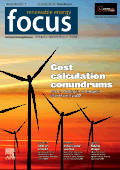
Renewable Energy Focus
Leading the Way in Sustainable Energy InnovationsRenewable Energy Focus is a premier journal published by Elsevier, dedicated to advancing the field of renewable energy and sustainability. With an ISSN of 1755-0084 and an E-ISSN of 1878-0229, this journal serves as a vital platform for researchers, professionals, and students interested in innovative solutions to energy challenges. Established in 2007, the journal has evolved to become a recognized authority in the subject area, currently ranked in the Q2 quartile of its category for 2023, emphasizing its significance in promoting impactful research. The journal encompasses a wide range of topics, including solar, wind, bioenergy, and sustainable practices that contribute to environmental conservation and energy efficiency. As part of Elsevier's commitment to disseminating high-quality research, Renewable Energy Focus is indexed in Scopus, currently holding a rank of #92/270 in the energy sector, positioning it in the 66th percentile of its field. This journal offers an essential resource for those dedicated to fostering sustainable energy solutions.
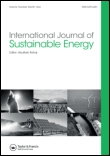
International Journal of Sustainable Energy
Unleashing Potential in Sustainable Energy InnovationInternational Journal of Sustainable Energy is a premier peer-reviewed journal published by TAYLOR & FRANCIS LTD that serves as a vital platform for the dissemination of innovative research in the field of sustainable energy. With an ISSN of 1478-6451 and an E-ISSN of 1478-646X, this journal has established a significant reputation, currently ranked in the Q2 category across multiple disciplines such as Energy (miscellaneous), Fluid Flow and Transfer Processes, and Fuel Technology, reflecting its commitment to high-quality academic contributions. The journal has been Open Access since 2022, ensuring that research is freely accessible to a global audience, fostering collaboration and knowledge sharing. Positioned in the United Kingdom, the journal strives to address the critical challenges surrounding renewable energy and sustainability, appealing to researchers, professionals, and students alike. The Scopus rankings further enhance its credibility, showcasing its impact in the field with notable percentiles across various energy-related categories. With converged years from 2003 to 2024, the International Journal of Sustainable Energy remains a cornerstone for innovative research that seeks to pave the way towards a more sustainable future.
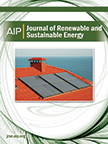
Journal of Renewable and Sustainable Energy
Catalyzing Change in Renewable Energy ResearchThe Journal of Renewable and Sustainable Energy, published by AIP Publishing, stands at the forefront of research in the fields of renewable energy and sustainable practices. With an ISSN of 1941-7012, this journal aims to foster innovative research and exchange of knowledge on sustainable technologies and methodologies that contribute to environmental conservation and energy efficiency. Achieving a prestigious Q2 ranking in the category of Renewable Energy, Sustainability, and the Environment, it ranks 135 out of 270 journals in Scopus, signifying its impactful contributions to the field. The journal, active from 2010 to 2024, provides a platform for authors, analysts, and practitioners to disseminate significant findings that can shape future environmental policies and energy frameworks. Although not currently an Open Access publication, it remains an essential resource for researchers dedicated to advancing sustainable development and energy solutions.

Advanced Energy and Sustainability Research
Exploring Innovations in Energy and Environmental ScienceAdvanced Energy and Sustainability Research is a leading open-access journal published by WILEY since 2020, dedicated to advancing knowledge and understanding in the realms of energy and sustainability. With an impressive impact factor and a commitment to high-quality, peer-reviewed research, this journal serves an international audience of researchers, professionals, and students passionate about addressing critical environmental challenges. The journal encompasses a wide array of topics within environmental science and energy fields, securing notable rankings in Scopus with top percentiles across several categories, including Ecology, Energy Engineering and Power Technology, and Waste Management. Given its open-access model, Advanced Energy and Sustainability Research facilitates the dissemination of cutting-edge research, enhancing accessibility and fostering collaboration within the scientific community. This journal not only plays a pivotal role in shaping public policy and industry practices but also aims to inspire innovative solutions for sustainable development in an increasingly complex world.
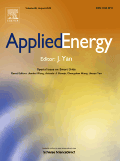
APPLIED ENERGY
Empowering engineering solutions for a greener tomorrow.APPLIED ENERGY, published by Elsevier Science Ltd, is a leading journal dedicated to the advancing field of energy research, focusing on practical engineering solutions to contemporary challenges in energy management, sustainability, and environmental impact. With a rigorous peer-review process and a strong commitment to promoting innovative research, APPLIED ENERGY proudly holds multiple Q1 rankings across various categories, including Building and Construction, Civil and Structural Engineering, and Renewable Energy, reflecting its prestigious position within the academic community. Researchers and professionals can benefit from its comprehensive scope, covering topics that span from policy and technology to market dynamics. Although it is not an open-access journal, it provides access options that facilitate research dissemination. With its historical significance since 1975 and an ambitious outlook up to 2025, APPLIED ENERGY continues to be an essential resource for anyone looking to stay at the forefront of energy research and application.
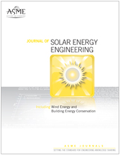
JOURNAL OF SOLAR ENERGY ENGINEERING-TRANSACTIONS OF THE ASME
Harnessing Knowledge for Tomorrow's Solar Solutions.JOURNAL OF SOLAR ENERGY ENGINEERING-TRANSACTIONS OF THE ASME is a premier publication dedicated to advancing the field of solar energy engineering, under the auspices of the prestigious American Society of Mechanical Engineers (ASME). With the ISSN 0199-6231 and E-ISSN 1528-8986, this journal has established itself as a critical resource for researchers and professionals alike, particularly in the areas of energy engineering and renewable technology. Currently enjoying an impact factor that places it in the Q2 category for Energy Engineering and Power Technology and Q3 for Renewable Energy, Sustainability, and the Environment, this journal effectively bridges impactful research and practical application. Spanning contributions from 1980 to 2025, the journal emphasizes empirical studies, innovative methodologies, and sustainable solutions that resonate with the growing global demand for renewable energy. The journal’s commitment to quality is reflected in its competitive Scopus rankings: 97th out of 272 in Energy Engineering and 124th out of 270 in Renewable Energy. Although not an Open Access journal, it remains a vital forum for disseminating research that shapes our energy future. Located in New York, this journal serves as a cornerstone for those in academia and industry to stay abreast of the latest advancements in solar energy technologies and their application in sustainable development.

AIMS Energy
Bridging Ideas and Innovations in Energy ScienceAIMS Energy is a leading academic journal published by the American Institute of Mathematical Sciences (AIMS), dedicated to advancing the field of energy research. With a strong commitment to Open Access since its inception in 2013, this journal offers a platform for researchers, professionals, and students to share innovative findings and enrich the discourse in crucial areas such as Energy Engineering and Power Technology, Fuel Technology, and Renewable Energy, Sustainability and the Environment. Recognized for its quality, AIMS Energy holds a respectable impact with a Q3 ranking in multiple categories as of 2023, and it ranks within the top half of its peers in the Scopus database. The journal's objective is to disseminate high-quality research that addresses contemporary challenges in energy and offers sustainable solutions. By fostering collaboration and discussion among various stakeholders, AIMS Energy plays a critical role in shaping the future of energy technologies and policies.

Journal of the Japan Institute of Energy
Transforming Energy Knowledge into Action.Journal of the Japan Institute of Energy, ISSN 0916-8753, is a reputable academic journal dedicated to the field of energy studies, reflecting the dynamic and evolving landscape of energy research. Published by the Japan Institute of Energy, the journal serves as a platform for disseminating innovative research, technologies, and methodologies related to energy engineering, renewable energy sources, and sustainability practices. While this journal does not currently offer open access, it remains a vital resource for professionals, researchers, and students alike, particularly those focused on advancing knowledge within Energy Engineering and Power Technology, Fuel Technology, and related areas. As of 2023, it is ranked in the Q4 quartile across several categories in Scopus, which highlights its foundational role in fostering scholarly discourse, despite its lower ranking in the competitive global landscape. Established in 1990 and continuously evolving, the journal provides insights into the challenges and innovations in the energy sector, making it an essential read for anyone invested in the future of energy solutions.